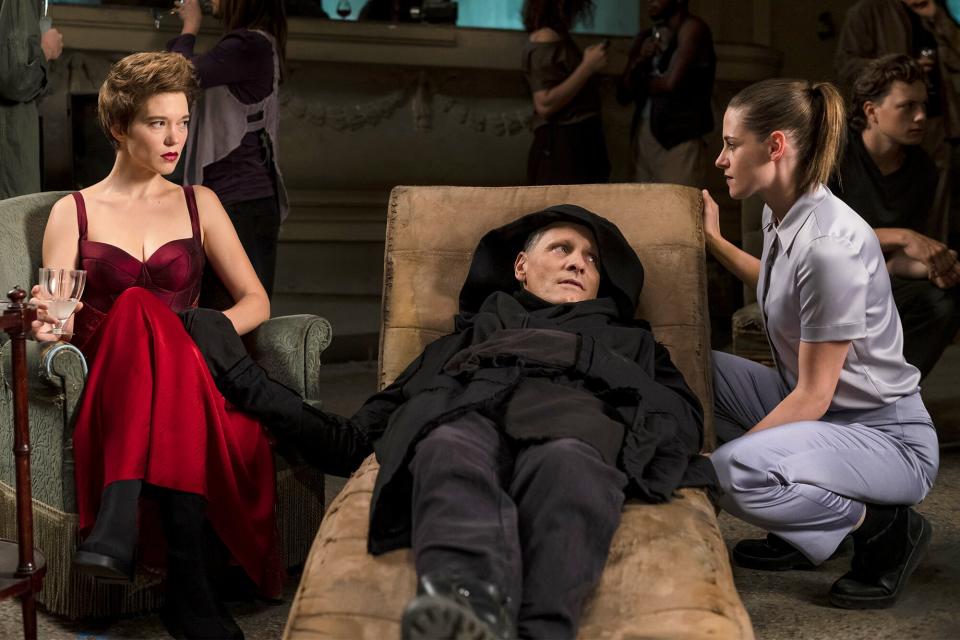Cannes review: David Cronenberg's glossy, inscrutable Crimes of the Future skates on style
- Oops!Something went wrong.Please try again later.
- Oops!Something went wrong.Please try again later.
- Oops!Something went wrong.Please try again later.
If he wasn't a filmmaker, David Cronenberg probably should have been a sculptor, or a surgeon. The director's enduring fascination with the squish and viscera of modern life, his urge to explore the outer limits of organic shapes and forms, informs nearly all his movies — from '80s arthouse curiosities like Scanners and Videodrome to the early-2000s career apex of A History of Violence and Eastern Promises.
Crimes of the Future (which premiered last night at the Cannes Film Festival, and arrives in theaters June 3) sometimes feels like a Cronenberg Greatest Hits, at least aesthetically; so loaded does it it come with his signature themes and gooey, seemingly hand-crafted contours. It also has his longtime muse-collaborator Viggo Mortenson, and two lovely and extremely game female movie stars, Kristen Stewart and Léa Seydoux, to execute his vision. What it doesn't appear overly concerned with at any point is a linear plot, or a larger sense of what exactly the director wants to say about the future that we don't already know.

Nikos Nikolopoulos/Neon Léa Seydoux, Viggo Mortensen, and Kristen Stewart in 'Crimes of the Future.'
Mortensen is Saul Tenser, a performance artist living in some grim unspecified post-now whose anatomy, as it were, is the art: a constantly self-modifying vessel that seems to be mutating at an accelerated pace, producing new unknowable organs overnight. Seydoux (No Time to Die, The French Dispatch) is his personal and professional partner, a former trauma surgeon who has pivoted to working the underground showcases — they look like fight clubs, but onlookers hover and chatter like guests at an Art Basel cocktail party — where people gather to witness the outré novelty of what anomalous bodies like Saul's can produce.
Or as Stewart's excitable Timlin puts it, "Surgery is the new sex." Timlin is one of two employees at the National Organ Registry, a back-alley operation that seems to function just outside some dusty, forgotten corner of bureaucracy. (The film was shot on location in Athens, Greece, and the ancient patina of its cracked-plaster walls and abandoned boatyards feels real). She's an odd bird, both tremulous and aroused by the possibilities of a "human evolution [that] is uncontrolled, insurrectional." Though maybe not as invested as a man named Lang Daughtery, a grieving father and rebel leader whose urgent proselytizing for some sort of soylent bar — it's not green but a dense, grape-y purple — hints at the Darwinian sea change already in motion.
Ahead of Crimes' Cannes premiere, Cronenberg announced, with some self-importance, that he expected walkouts within the first five minutes. (To be fair, it wouldn't be the first time; Crash, his notorious dip into auto-erotica, famously inspired more than a few dramatic exits when it bowed at the festival in 1996). In that same interview, he also revealed that he penned this particular script 20 years ago, which may explain the lag in his thinking: The festival that last year gave its ultimate prize, the Palme d'Or, to Julia Ducournau's Titane — a movie that arguably wouldn't even exist without Crash — seems unlikely to clutch its pearls over the mild provocations here. (Though there is no shortage of fleshy violations, full-frontal nudity, and at least one case of filicide; Greek tragedy, indeed).
Aside from a few neat visual tricks — a chair seemingly made of rubberized bones, a writhing dancer dotted with real human ears like a walking Duchamp punchline — the film unfurls mostly in shadows and corners, and so do its characters' inner lives. There's not much to grab onto logic-wise, because so little is revealed. (A story thread involving an offbeat detective mostly dissipates, as does one with a pair of comely, murderous machinists who nevertheless find the time to lose all their clothes before they go.) That leaves Cronenberg's gifted cast to pile intrigue and emotion on a mostly blank page: an arty indulgence pinging between visceral body horror and neo-noir thriller, and landing somewhere inscrutable in between. Grade: C+
Related content:
Cannes Film Festival 2022 preview: 12 movies not to miss
Legendary filmmaker David Cronenberg on his return to directing
Rachel Weisz (and Rachel Weisz) to star in TV adaptation of David Cronenberg's Dead Ringers

